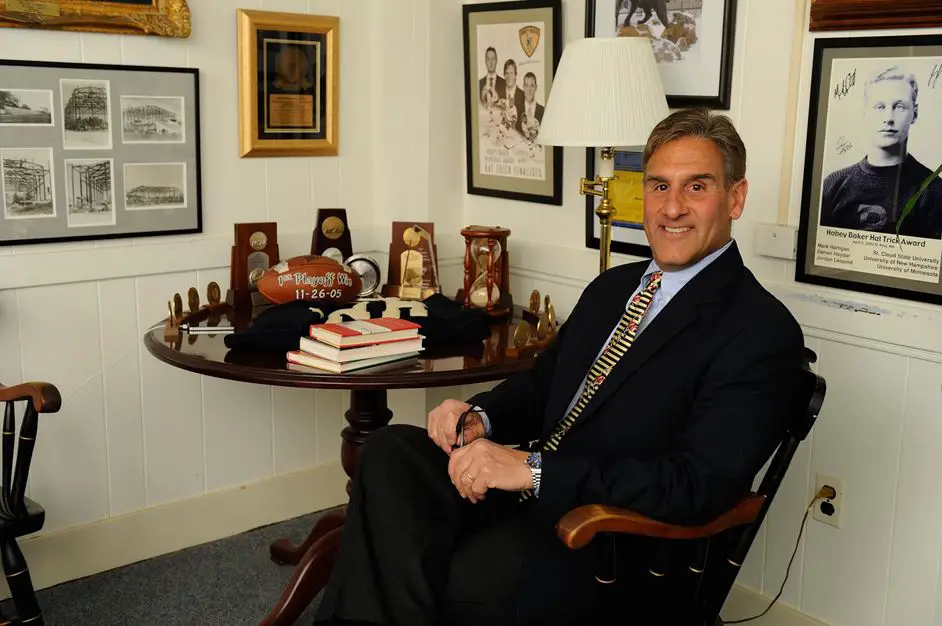
While Marty Scarano treated all sports under his watch equally in his more than two decades as athletic director at New Hampshire, there’s no question that hockey holds a special place in his heart.
In fact, it was hockey that brought Scarano to New Hampshire at the turn of the millennium. Then the AD at Colorado College, an early attempt by Scarano to recruit UNH legend Dick Umile to coach the Tigers ended up with Scarano taking a job as Umile’s boss.
“It was right out of ‘The Godfather,'” Scarano said about an unofficial “interview” he had with Umile at a popular Italian restaurant in nearby Portsmouth. “The owner came out, we had a special dinner, Dick and I spent two hours together. That had a lot to do with me coming here.”
After 22 years, Scarano’s calling it a career. So it was altogether appropriate for UNH to hold his official going-away party (his retirement is effective at the end of the school year) at Saturday’s men’s hockey game vs. Merrimack. With family, friends, and a large contingent of UNH student athletes and coaches (past and present) by his side, Scarano was saluted in a pre-game ceremony.
“I obviously have a love for it,” Scarano said of the sport that brought him to the Granite State. “It’s a very special sport. It’s a classic niche sport. There’s a lot of parity. Some people say it’s not good for the sport, I think it is.”
Umile said Scarano’s legacy at UNH speaks for itself.
“He’s done a tremendous job in a tough place to be an athletic director, with limited funds,” Umile said. “But he found ways to get it done.”
At the time of his hiring, UNH was at its apex as a hockey program on both the men’s and women’s sides. The men’s program made the NCAA tournament 17 times between 1998-2013, including four Frozen Four appearances between 1998 and 2003. The women’s team won the AWCHA D-I national title in 1998, made the NCAA Frozen Four in 2006 and followed that up with four straight tournament appearances.
While the program remains nationally prominent and has had success off the ice (Scarano touted a graduation rate of more than 95 percent for the men’s team and 100 percent for the women), it has taken a back seat in the discussion of national contenders. Next year will mark 10 years since the men’s team’s last NCAA tournament appearance and 20 since its last trip to the Frozen Four.
“If there’s one regret that I have, it’s that I haven’t gotten hockey back to where it should be,” Scarano said. “I’m taking full responsibility for that. I believe in (current coach) Mike Souza. He’s the right coach. We have work to do. In my heart of hearts, I do believe UNH should be a top-10, if not top-five, program.”
Scarano said a program reboot is in the works, centering around significant upgrades to the Whittemore Center, the Wildcats’ home arena, which will soon enter its fourth decade of service.
The renovations, which Scarano said will begin the day after the season ends, include replacing the ice-making apparatus, reducing the width of the surface from an Olympic-sized sheet to NHL standard, new boards and glass, and a new sound system.
“We’re going to invest in hockey. We’re going to get back to where we should be,” Scarano said. “UNH is hockey royalty.”
Scarano said his main focus has always been the success of student athletes.
“Wins and losses are very important — I think people think that isn’t our end analysis, but it is,” he said. “But more so, we want to grow kids up to be good citizens. I have a lot of coaches who might not have maybe as many wins as fans want, but they do a great job in growing kids up and graduating kids.”
Souza, who played for the Wildcats from 1996 to 2000 (including a 3-2 loss to the Scarano-administered Colorado College team in the first round of the 1997 NCAA tournament), said he has always admired Scarano’s commitment to student athletes.
“I think that’s something that’s become, I don’t want to say further and farther between, but it’s what we do,” Souza said. “It’s the most important part of our job. And Marty’s never lost sight of that.”


